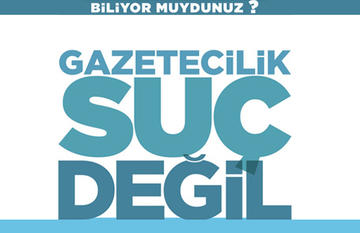
Amidst growing pressure on journalism and the freedom of the media in Turkey, a group of journalists has come together to launch a new initiative, named “I am a journalist”
The initiative aims to protect the right of access to free information, as well as high-quality journalism, by raising awareness on the constant repression suffered by media professionals in the country. It is the voice of those who have been silenced, threatened, arrested and intimidated for performing their job: exposing true facts and informing citizens.
Its first activity will come about in the next days: we will see a banner saying “Did you know? Journalism is not a crime” on many news platforms, both in Turkish and Kurdish. For five days, readers will be able to read “Biliyor muydunuz? Gazetecilik Suç Değil” (in Turkish) or “Hûn Vê Dizanin? Rojnamegerî Ne Sûc e” (in Kurdish) on newspapers, TV channels and websites, in a hopeful joint action by the first supportes who adhered the campaign, among which are Cumhuriyet daily, Evrensel daily, Agos weekly, Azadiya Welat daily, BirGün daily, Halkın Nabzı, Özgür Gündem daily, Yurt and the websites T24, P24, Haberdar, Diken, Sendika Org, Jiyan, ABC, Journo, Dağ Medya, Solfasol, İlke Haber and İMC.
The campaign highlights the importance of solidarity to counter repression and human rights violations, as even foreign journalists have been targetted in the country, and the profession risks being labelled as a crime. As put in a statement by the initiative, "In a society deprived of the right to receive information, it is not possible to talk about democracy. We will repel all the gags put over the mouths of the people who have been detained, silenced and imprisoned for performing their jobs or supporting freedom of the press. We are journalists and we shout out: Journalism is not a crime! "
Link: Bianet
This publication has been produced within the project European Centre for Press and Media Freedom, co-funded by the European Commission. The contents of this publication are the sole responsibility of Osservatorio Balcani e Caucaso and its partners and can in no way be taken to reflect the views of the European Union. The project's page

 Did you know? Journalism is not a crime
Did you know? Journalism is not a crime




 All the contents on the Osservatorio Balcani e Caucaso website are distributed with a
All the contents on the Osservatorio Balcani e Caucaso website are distributed with a 